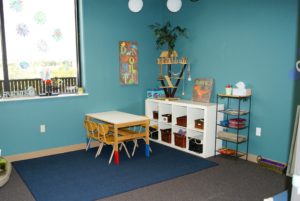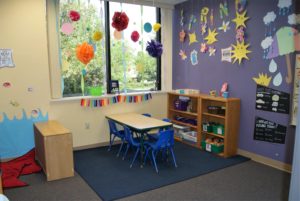
Our programs have a strong child development foundation; we know not just how to teach children but what the children should be learning. Understanding where a child resides in developmental patterns and sensitive periods, and what the child’s play style, preferences and strengths are allow us to set specific, accurate and relevant goals and teach new skills in ways that the child most likes to and most naturally learns. We use the Positive Behavior System of Applied Behavior Analysis and with its Alternate Behavior Model we have been very successful teaching children new skills that eliminate misbehavior. We adhere to strong humanistic and respectful values and teach children appropriate social skills in ways that are carefully designed to be enjoyable for the child.
Our social skills programs intentionally look and feel like playgroups but the therapy we provide is actually one therapist to one child. Each ‘group’ is composed of children of close but mixed ages/developmental skills who share some play preferences and styles. The children are placed in groups in an effort to support one child’s gifts and support another child’s challenges. A child who has mastered a skill or concept is, in Vygotskian terms, an ‘expert’. (Lev Vygotsky was the scientist who pioneered our understanding of developmental patterns and social constructionist theory.) Children who have mastery of a skill or concept are good models for other peers to imitate and learn from just like a child without a diagnosis makes a good model. Each child’s various mastered skills allow for children to naturally support one another. As you are all aware, we do include child volunteers in our program as models, peers, and friends.
Many of these children are siblings of children served by MAPS. Siblings really enjoy being part of the community; they are celebrated, included and know they are valued. MAPS especially likes for siblings to participate because we know that the experience equips siblings to better support their sibling with special needs. Siblings usually are usually not included in other types of therapies and thus spend lots of time waiting in waiting rooms. From the sibling’s perspective the attention is always given to their brother or sister … that can be tough. MAPS knows that the best way to help a child with special needs is for everyone in that child’s life to be consistent with expectations, demands, and privileges. When siblings participate we are guiding, teaching and supporting them so they can in turn help their sister or brother.
Some children who participate as volunteers are friends and/or classmates of children who come to MAPS. Including classmates and neighborhood friends to participate in your child’s program at MAPS is a really fantastic opportunity. Your child’s true and actual peers can help pave the way for good social experiences in your child’s natural environments. These children can intercede to support your child in the larger peer group at school or in the neighborhood. They can help demystify and clarify your child’s sometimes awkward or idiosyncratic behaviors or communication to the larger peer group. True friendships can begin when we have the opportunity to foster these kinds of relationships. MAPS is always happy to provide tours, host meet-ups and support any parent’s efforts to expand our community but first we need for you, as parents, to participate in this effort.
Some of the children volunteering at MAPS are the children from outside the MAPS community; kind strangers wanting to be part of our community. Most have no connection to MAPS or any experience with special needs.These children’s parents volunteer their children to participate at MAPS because they believe that the experience will benefit their child and because they believe that participation is a morally ‘good’ idea. We have begun a partnership with an organization called Hands 4 Hope. These folks help people that wish to volunteer to find places to volunteer. Wherever the volunteers come from they are truly a gift to be grateful for.
